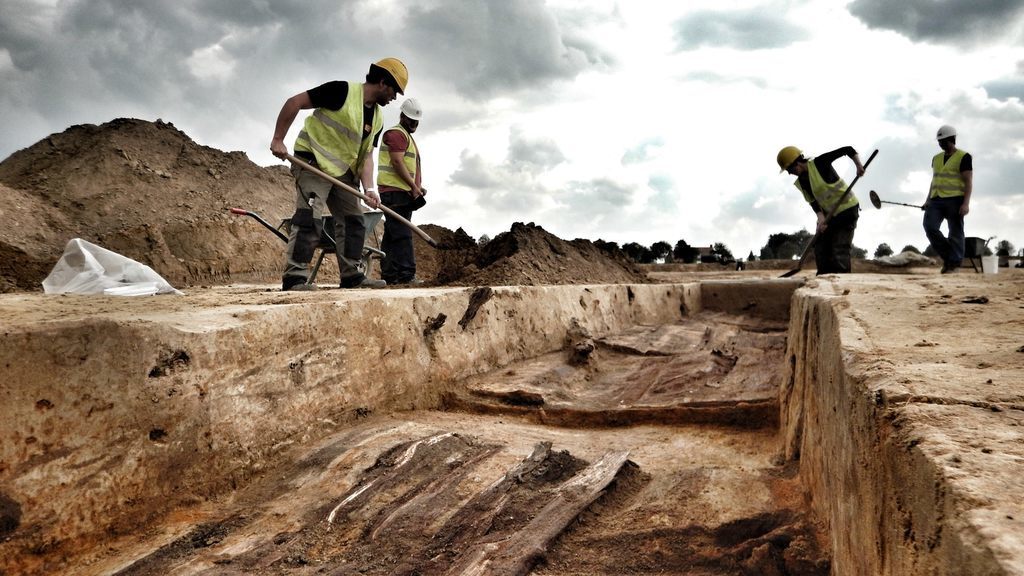More than 100 First World War skeletons discovered in Belgian trench
Experts will attempt to identify the soldiers, some as young as 15, in order to bury them ‘with full military honours’

A free daily email with the biggest news stories of the day – and the best features from TheWeek.com
You are now subscribed
Your newsletter sign-up was successful
The bodies of 125 soldiers from the First World War, some of them teenagers, have been discovered in a German-built trench system, more than a century after they were killed in action.
The skeletal remains were found on a ridge outside the Belgian city of Ypres known as Hill 80, near the village of Wijtschate - known as Whitesheet to British troops, The Times says. As a key German defensive position, it was the site of intense fighting in June 1917, when it was captured by allied forces during the Battle of Messines, and later when the Germans re-took it in 1918.
The trench had been covered over and remained untouched since the end of the conflict.
The Week
Escape your echo chamber. Get the facts behind the news, plus analysis from multiple perspectives.

Sign up for The Week's Free Newsletters
From our morning news briefing to a weekly Good News Newsletter, get the best of The Week delivered directly to your inbox.
From our morning news briefing to a weekly Good News Newsletter, get the best of The Week delivered directly to your inbox.
Experts believe that approximately 100 of the soliders are German, most of them killed by shot or shell fire, though the remains of a number of British and Commonwealth soldiers are also present. Some of the soldiers are estimated to have been as young as 15.
Other remains were buried in mass graves alongside religious artefacts placed there by their comrades, says the Daily Express. A number of other “poignant personal effects” were also found on the men, including “helmets, rifles, ammunition, search lights, water bottles, cooking utensils, coffee pots, watches, cap badges, toothbrushes and even a bottle of HP sauce and a tin of Andrews Liver Salts”.
The painstaking task has now begun of finding out their identities and to which regiments they belonged so they can be buried with full military honours.
Professor Peter Doyle, of London South Bank University, one of the leaders of Dig Hill 80, said: “When you look at these mass graves and think of these young men, you know they had a mother and father who missed them. Yet they have never been given peace.”
A free daily email with the biggest news stories of the day – and the best features from TheWeek.com
-
 The environmental cost of GLP-1s
The environmental cost of GLP-1sThe explainer Producing the drugs is a dirty process
-
 Greenland’s capital becomes ground zero for the country’s diplomatic straits
Greenland’s capital becomes ground zero for the country’s diplomatic straitsIN THE SPOTLIGHT A flurry of new consular activity in Nuuk shows how important Greenland has become to Europeans’ anxiety about American imperialism
-
 ‘This is something that happens all too often’
‘This is something that happens all too often’Instant Opinion Opinion, comment and editorials of the day
-
 Epstein files topple law CEO, roil UK government
Epstein files topple law CEO, roil UK governmentSpeed Read Peter Mandelson, Britain’s former ambassador to the US, is caught up in the scandal
-
 Iran and US prepare to meet after skirmishes
Iran and US prepare to meet after skirmishesSpeed Read The incident comes amid heightened tensions in the Middle East
-
 Israel retrieves final hostage’s body from Gaza
Israel retrieves final hostage’s body from GazaSpeed Read The 24-year-old police officer was killed during the initial Hamas attack
-
 China’s Xi targets top general in growing purge
China’s Xi targets top general in growing purgeSpeed Read Zhang Youxia is being investigated over ‘grave violations’ of the law
-
 Panama and Canada are negotiating over a crucial copper mine
Panama and Canada are negotiating over a crucial copper mineIn the Spotlight Panama is set to make a final decision on the mine this summer
-
 Why Greenland’s natural resources are nearly impossible to mine
Why Greenland’s natural resources are nearly impossible to mineThe Explainer The country’s natural landscape makes the task extremely difficult
-
 Iran cuts internet as protests escalate
Iran cuts internet as protests escalateSpeed Reada Government buildings across the country have been set on fire
-
 US nabs ‘shadow’ tanker claimed by Russia
US nabs ‘shadow’ tanker claimed by RussiaSpeed Read The ship was one of two vessels seized by the US military